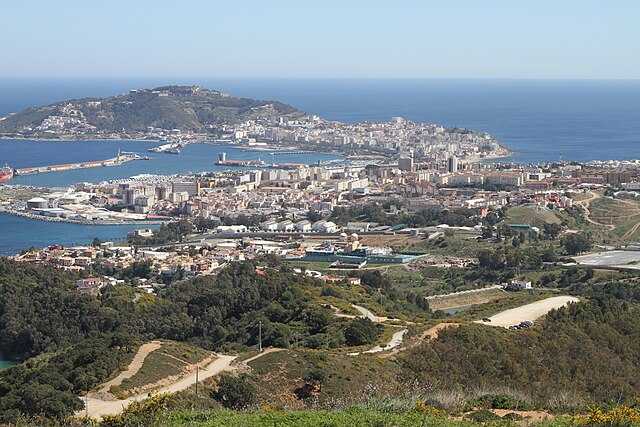
Ceuta
Spanish autonomous city on the north-west coast of Africa / From Wikipedia, the free encyclopedia
Dear Wikiwand AI, let's keep it short by simply answering these key questions:
Can you list the top facts and stats about Ceuta?
Summarize this article for a 10 year old
Ceuta (UK: /ˈsjuːtə/, US: /ˈseɪuːtə/,[5][6] Spanish: [ˈsewta, ˈθewta]; Tarifit: ⵙⴰⴱⵜⴰ, romanized: Sabta; Arabic: سَبْتَة, romanized: Sabtah) is an autonomous city of Spain on the North African coast.
Ceuta
ⵙⴰⴱⵜⴰ سَبْتَة | |
|---|---|
Palace of the Assembly | |
| Anthem: Ceuta, mi ciudad querida [es] "Ceuta, my beloved city" | |
 Location of Ceuta in Africa | |
| Coordinates: 35°53′18″N 5°18′56″W | |
| Country | |
| First settled | 1st millennium BC |
| End of Muslim rule | 14 August 1415 |
| Ceded to Spain/Iberian Union | 4 August 1578 |
| Autonomy status | 14 March 1995 |
| Founded by | Carthaginians |
| Government | |
| • Type | Autonomous city |
| • Body | Council of Government |
| • Mayor-President | Juan Jesús Vivas (PP) |
| Area | |
| • Total | 18.5 km2 (7.1 sq mi) |
| • Land | 18.5 km2 (7.1 sq mi) |
| • Rank | 18th |
| Elevation | 10 m (30 ft) |
| Highest elevation | 349 m (1,145 ft) |
| Population (2018)[1] | |
| • Total | 85,144 |
| • Rank | 19th |
| • Density | 4,600/km2 (12,000/sq mi) |
| • Rank | 2nd |
| Demonyms | Ceutan ceutí (es) caballa ("Atlantic mackerel", colloquial)[2][3] |
| GDP | |
| • Total | €1.907 billion (2022) |
| • Per capita | €23,073 (2022) |
| Time zone | UTC+01:00 (CET) |
| • Summer (DST) | UTC+02:00 (CEST) |
| ISO 3166 code | ES-CE |
| Postal code | 51001–51005 |
| Official language | Spanish |
| Parliament | Assembly of Ceuta |
| Congress | 1 deputy (out of 350) |
| Senate | 2 senators (out of 264) |
| Currency | Euro (€) (EUR) |
| Website | www.Ceuta.es |
Bordered by Morocco, it lies along the boundary between the Mediterranean Sea and the Atlantic Ocean. Ceuta is one of the special member state territories of the European Union, and it is one of several Spanish territories in Africa, which include Melilla and the Canary Islands. It was a regular municipality belonging to the province of Cádiz prior to the passing of its Statute of Autonomy in March 1995,[7] as provided by the Spanish Constitution, henceforth becoming an autonomous city.
Ceuta, like Melilla and the Canary Islands, was classified as a free port before Spain joined the European Union.[8] Its population is predominantly Christian and Muslim, with a small minority of Sephardic Jews and Sindhi Hindus, from Pakistan.[9]
Spanish is the official language. Spanish and Darija Arabic are the two main spoken languages.




